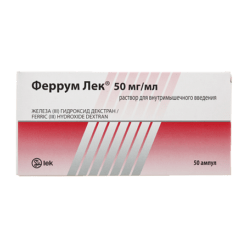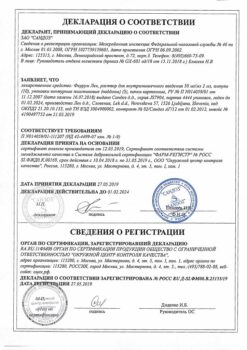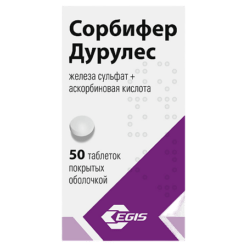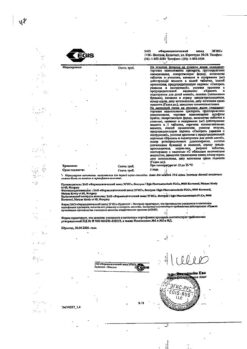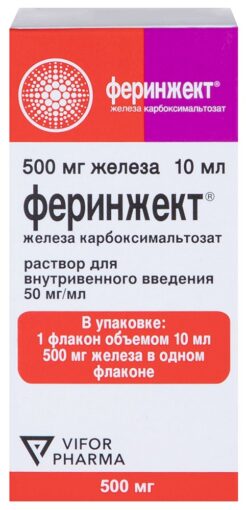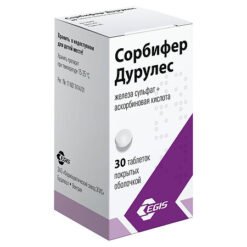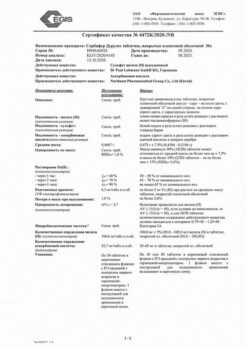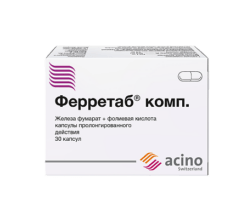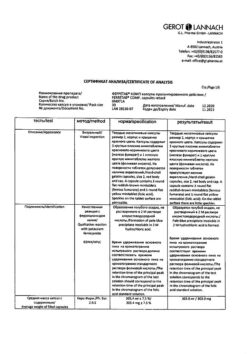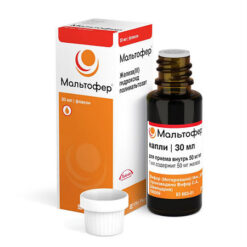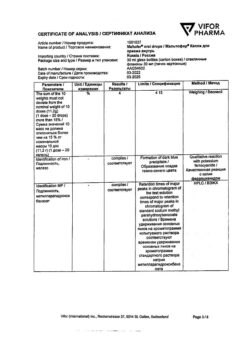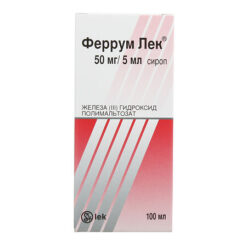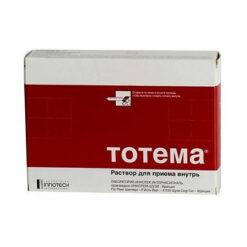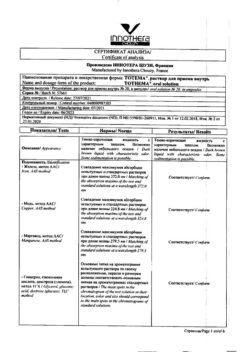No products in the cart.
Arykstra, 2.5mg/0.5 ml 0.5 ml syringes 10 pcs
€1.00
Out of stock
(E-mail when Stock is available)
Description
Antithrombotic drug. Synthetic selective inhibitor of activated factor X (Xa). Antithrombotic activity is the result of selective inhibition of factor Xa mediated by antithrombin III.
Indications
Indications
Prevention of venous thromboembolic complications in patients undergoing “major” orthopedic operations on the lower extremities (fracture of the hip joint, including long-term prophylaxis in the postoperative period; knee replacement surgery; hip replacement surgery);
prevention of venous thromboembolic complications in patients undergoing abdominal surgery and at risk of thromboembolic complications;
prevention of venous thromboembolic complications in non-surgical patients in the presence of risk factors for such complications due to limited mobility in the acute period of the disease;
treatment of acute deep vein thrombosis;
treatment of pulmonary embolism;
treatment of acute coronary syndrome, the manifestation of which is unstable angina or non-ST segment elevation myocardial infarction, in order to prevent cardiovascular death, myocardial infarction or refractory ischemia;
treatment of acute coronary syndrome, the manifestation of which is myocardial infarction with ST segment elevation, to prevent death, recurrent myocardial infarction in patients receiving thrombolytic therapy or patients who initially did not receive reperfusion therapy;
treatment of acute symptomatic thrombosis of the superficial veins of the lower extremities without concomitant deep vein thrombosis.
Pharmacological effect
Pharmacological effect
Antithrombotic drug. Synthetic selective inhibitor of activated factor X (Xa). Antithrombotic activity results from selective inhibition of factor Xa mediated by antithrombin III.
Special instructions
Special instructions
If after therapy with Arixtra it is necessary to continue the prophylactic use of heparin or low molecular weight heparins, then the first injection of heparins should be given one day after the last administration of Arixtra.
If maintenance therapy with vitamin K antagonists is necessary, concomitant administration of fondaparinux sodium should be continued until the target INR (international normalized ratio) is achieved.
When using Arixtra simultaneously with epidural anesthesia or spinal puncture, the possibility of epidural or spinal hematomas, which can lead to paralysis, cannot be excluded. The risk of this rare complication may be increased by postoperative use of indwelling epidural catheters or concomitant administration of other drugs that affect hemostasis.
Elderly people have an increased risk of bleeding. Because renal function generally declines with age, the elimination of fondaparinux sodium may be reduced in elderly patients, thereby increasing drug exposure. Therefore, Arixtra should be used with caution in elderly patients.
Patients weighing less than 50 kg are at greater risk of bleeding because… excretion of fondaparinux sodium is reduced in these individuals. In such patients, Arixtra should be used with caution.
The risk of bleeding increases in patients with impaired renal function with CC less than 50 ml/min.
In case of moderate renal impairment, Arixtra should be prescribed with caution.
When prescribing the drug to patients with impaired liver function, there is no need to adjust the dose of Arixtra. However, in severe liver dysfunction due to a deficiency of coagulation factors, the risk of bleeding increases, so Arixtra should be used with caution.
Before starting use and at the end of therapy, monitoring the platelet count is recommended. This is especially important in cases where maintenance treatment with heparin or low molecular weight heparins is intended.
Active ingredient
Active ingredient
Fondaparinux sodium
Composition
Composition
1 syringe contains:
fondaparinux sodium 2.5 mg.
Excipients:
Pregnancy
Pregnancy
Arkistra should not be prescribed during pregnancy unless the expected benefit to the mother outweighs the potential risk to the fetus.
There is no clinical experience with the use of the drug during pregnancy. Experimental studies on the effect of fondaparinux sodium on the course of pregnancy, embryo/fetal development, as well as on childbirth and postnatal development are insufficient due to limited exposure.
While using the drug, you should stop breastfeeding.
It has been established that fondaparinux sodium is excreted into the milk of rats, but there is no data on excretion in breast milk in women during lactation. Absorption of fondaparinux sodium in a breastfed baby is unlikely.
Contraindications
Contraindications
– Active, clinically significant bleeding;
– acute bacterial endocarditis;
– severe renal failure (KK – conditions associated with the risk of bleeding (blood clotting disorders, including hemophilia, thrombocytopenia, hypocoagulation, von Willebrand disease);
– peptic ulcer of the stomach and duodenum in the acute phase;
– hemorrhage in the brain;
– cerebral aneurysm;
– uncontrolled arterial hypertension (increases the risk of cerebral hemorrhage);
– dissecting aortic aneurysm;
– diabetic retinopathy;
– repeated neurological or ophthalmological operations;
– carrying out spinal anesthesia (potential danger of hematoma development);
– threatened abortion;
– severe liver dysfunction;
– body weight less than 50 kg;
– combined use with drugs such as fibrinolytics, heparin, heparinoids, GP IIb/IIIa receptor antagonists, antiplatelet agents, NSAIDs;
– hypersensitivity to the components of the drug.
Prescribe with caution to patients with an increased risk of bleeding, for example, with a platelet count less than 50,000/μl, with gastric and intestinal ulcers, after recent intracranial hemorrhage or surgical interventions on the brain or spinal cord, after ophthalmological operations.
The use of Arixtra should be avoided in patients with heparin-induced thrombocytopenia type II (due to the lack of clinical experience with the drug).
Side Effects
Side Effects
The frequency of adverse reactions is presented in accordance with the following gradation: very often (>1/10), often (>1/100, 1/1000, 1/10,000, <1/1000); very rare (<1/10,000).
These adverse reactions should be considered in a surgical and therapeutic context depending on the indication.
From the hematopoietic system: often – anemia, bleeding (of various locations, including rare cases of intracranial/intracranial and retroperitoneal bleeding), purpura; sometimes – thrombocytopenia, thrombocythemia, platelet abnormality, coagulation disorders.
Metabolism: rarely – hypokalemia.
From the nervous system: sometimes – headache; rarely – anxiety, confusion, dizziness, drowsiness, loss of consciousness.
From the cardiovascular system: rarely – arterial hypotension.
From the respiratory system: rarely – shortness of breath, cough.
From the digestive system: sometimes – nausea, vomiting; rarely – abdominal pain, dyspepsia, gastritis, constipation, diarrhea.
From the liver and biliary tract: sometimes – abnormal results of liver tests, increased concentrations of liver enzymes in the blood; rarely – increased concentration of bilirubin in the blood.
From the skin and subcutaneous fat: sometimes – rash, itching, discharge from the wound.
Other: often – swelling; sometimes – fever; rarely – infection of a postoperative wound, chest pain, pain in the lower extremities, fatigue, facial flushing (hot flashes), syncope, allergic reactions, reactions at the injection site.
Interaction
Interaction
Oral anticoagulants (warfarin), platelet inhibitors (acetylsalicylic acid), NSAIDs (piroxicam) and digoxin do not affect the pharmacokinetics of fondaparinux sodium. Fondaparincus sodium did not affect the activity of warfarin, nor the bleeding time when using acetylsalicylic acid or piroxicam, nor the pharmacokinetics of digoxin at steady state.
Drugs that increase the risk of bleeding (desirudin, fibrinolytics, GP IIb/IIIa receptor antagonists, heparin, heparinoids or low molecular weight heparins) should not be used concomitantly with fondaparinux sodium.
The risk of bleeding increases when Arixtra is used together with substances that may increase the risk of bleeding (acetylsalicylic acid, other NSAIDs, dipyridamole, sulfinpyrazone, ticlopidine, clopidogrel). If it is necessary to use such a combination, therapy should be carried out with caution and under strict supervision.
Overdose
Overdose
Symptoms: bleeding.
Treatment: discontinuation of the drug, examination of the patient.
It is possible to use surgical hemostasis, replenish blood loss, transfusion of fresh plasma, and plasmapheresis.
Storage conditions
Storage conditions
At a temperature not exceeding 25 °C (do not freeze)
Shelf life
Shelf life
2 years
Manufacturer
Manufacturer
Aspen Notre Dame de Bondeville, France
Additional information
| Shelf life | 2 years |
|---|---|
| Conditions of storage | At a temperature not exceeding 25 °C (do not freeze) |
| Manufacturer | Aspen Notre Dame de Bondeville, France |
| Medication form | solution |
| Brand | Aspen Notre Dame de Bondeville |
Related products
Buy Arykstra, 2.5mg/0.5 ml 0.5 ml syringes 10 pcs with delivery to USA, UK, Europe and over 120 other countries.


